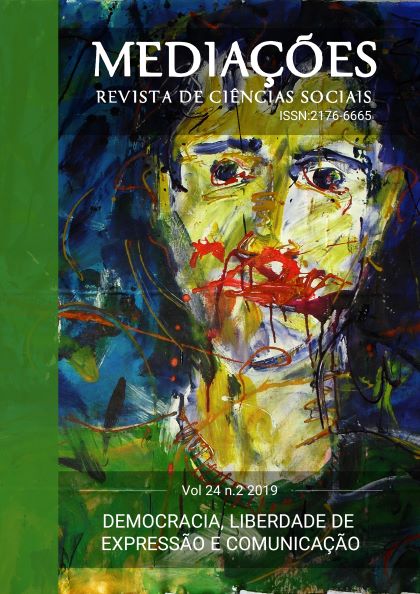Freedom of expression and democratic theory: concepts and perspectivesPECTIVES
DOI:
https://doi.org/10.5433/2176-6665.2019v24n2p83Keywords:
Political theory, Democratic theory, Freedom of speech, Autonomy, LibertyAbstract
This article is a literature review that aims to increase the discussion of different theories related to freedom of speech, and its relation to democracy focusing on comprehending how several conceptualizations of these two are related. Our cornerstone is to discuss the diversity of concepts and theoretical aspects and evaluate this phenomenon considering how it is based. Evaluations of the phenomenon of freedom of expression and democracy will be made not directly, but through consideration of how competing theories define their concepts and support their respective conceptions.Downloads
References
BARBER, Benjamin. Strong democracy: participatory politics for a new age. Berkeley: University of California Press, 2003.
BRISON Susan J. The autonomy defense of free speech. Ethics, Chicago, v. 108, n. 2, p. 312-339, Jan. 1998.
Published by: The University of Chicago Press
BLOKLAND, Hans. Pluralism, democracy, and political knowledge: Robert Dahls and his critics in modern politics. New York: Routledge, 2011.
COHEN, Joshua. Freedom of expression. Philosophy and Public Affairs, Delaware, DE, v. 22, n. 3, p. 207-263, 1993.
DAHL, Robert Sovereign. A preface to democratic theory. Chicago: The University of Chicago Press, 2006.
DAHL, Robert Sovereign. Poliarquia e oposição. São Paulo: Editora USP, 2005.
DAVENPORT, Thomas H. Ecologia da informação: por que só a tecnologia não basta para sucesso na era da informação. São Paulo: Futura, 2000.
DOWNS, Anthony. Uma teoria econômica da democracia. São Paulo: Edusp, 2013.
GUTMANN, Amy. A desarmonia da democracia. Lua Nova, São Paulo, n. 36, p. 5-37, 1995.
GUTMANN, Amy; THOMPSON, Dennis. Why deliberative democracy? Princeton, NJ: Princeton University Press, 2004.
HABERMAS, Jurgen. Mudança estrutural da esfera pública. São Paulo, Editora Unesp, 2011.
LAZARSFELD, Paul Felix; MERTON, Robert. Mass communication, popular taste and organized social action. In: ROSENBERG, Bernard; WHITE, David Manning (ed.). Mass cultures: the popular arts in America. New York: The Free Press; Londres: Collier‐Macmillan, 1957. p. 18-30.
LIPPMANN, Walter. Public opinion. New Jersey: Transaction Publishers, 2009.
MACPHERSON, Crawford Brough. The life and times of liberal democracy. New York: Oxford Univesity Press, 1977.
MARTINO, Luís Mauro Sá. Teoria da comunicação: ideias, conceitos e métodos. Petrópolis: Editora Vozes, 2014.
MEIKLEJOHN, Alexander. Political freedom: the constitutional powers of the people. Oxford: Oxford University Press, 1972.
O’NEILL, Onora. Practices of toleration. In: LICHTENBERG, Judith (ed.). Democracy and the mass media: a collection of essays. Cambridge: Cambridge University Press,1990. p. 155-185.
O’NEILL, Onora. The rights of journalism and the needs of audiences. In: REUTERS INSTITUTE FOR THE STUDY OF JOURNALISM (org.). Reuters memorial lecture. Oxford: St Anne’s College, 2011. p. 35-45.
PRZEWORSKI. Adam. Democracy and the limits of self-government. Cambridge: Cambridge University Press, 2010.
SARTORI, Giovanni. A teoria da democracia revisitada. São Paulo: Editora Ática, 1987.
SILVA, Ricardo. Participação como contestação: a ideia de democracia no neo-republicanismo de Philip Pettit. Política & Sociedade, Florianópolis, SC, v. 6, n. 11, p. 199-220, 2007.
SUNSTEIN, Cass R. Free speech now. The University of Chicago Law Review, Chicago, ILL, v. 59, p. 255, 1992.
URBINATI, Nádia. O que torna a representação democrática? Lua Nova, São Paulo, v. 67, n. 7, p. 191-228, 2006.
Downloads
Published
How to Cite
Issue
Section
License
Copyright on articles published in Mediações belongs to the author(s): in the case of partial or entire republication of the original publication, we ask author(s) to indicate the original publication in the periodical.
Mediações uses the Creative Commons Attribution 4.0 International license, which allows Open Access, enabling any user to read, download, copy and disseminate its content so long as adequately referenced.
The opinions expressed by the author(s) are their sole responsibility.
































